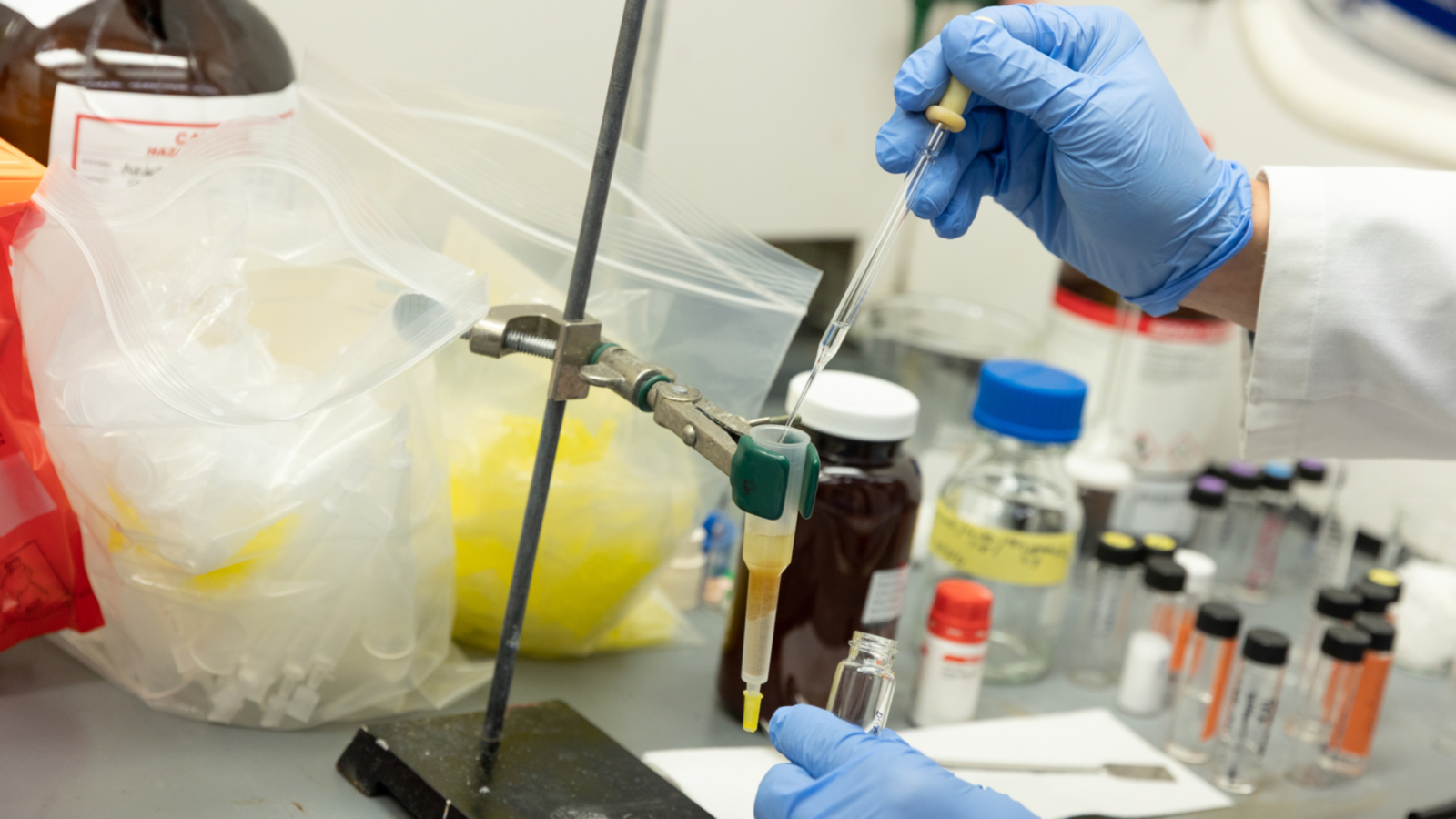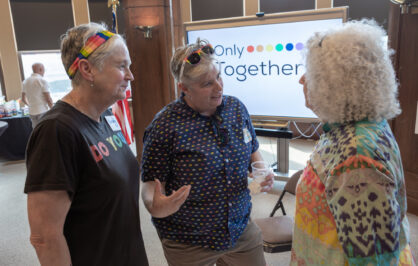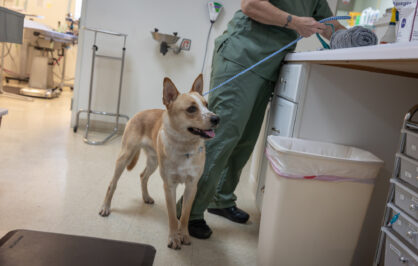
Media release
$440,000 in seed funding awarded to boost promising medical research projects
The grants are intended to help early-career researchers advance and bridge projects to the point where they can compete for national funding.
The Rhode Island Foundation has awarded $440,000 in seed funding to support 18 promising medical research projects.
The work ranges from reducing the incidence and severity of cervical cancer to testing strategies that will lessen developmental delays in premature babies. With this round of grants, the Foundation has awarded more than $6.1 million since 1997.
“Together with our donors, we can provide the crucial seed funding that enables local researchers to purse promising medical advances,” said David N. Cicilline, the Foundation’s president and CEO. “Although the grants are relatively modest, we hope they lead to big discoveries that will spark substantial new investments in the state’s research sector that will grow our economy as well as create healthy communities across Rhode Island.”
Laboratory, clinical and population-based research was eligible for funding. In addition to general medical research, grants were available to study infectious diseases, cardiac research, coronary artery disease, cerebral accidents, cancer, heart disease, multiple sclerosis, arthritis, diabetes, allergies and performance enhancing substances.
Women & Infants Hospital received $24,980 to reduce the incidence and severity of cervical cancer by developing a nationally available public website with accurate recommendations on Pap smears and resources on how to identify an appropriate doctor.
“We have built a prototype website reflecting age-specific guidelines. The website guides women to a tailored recommendation using user-provided information on age, presence of cervix, HIV status and prior screening results. The next phase is to evaluate the feasibility, fidelity and satisfaction with the website.” said lead researcher Dr. Matthew Oliver of the hospital’s Cancer Care Team.
Fifty women from the hospital’s gynecologic outpatient clinic will take part in the study, with at least five participants in each of four age groups ranging from under 21 years old to over 65 years old. All participants will be provided with a list of doctors who can perform a Pap smear.
“They will be asked to interact with the website, provide basic demographic information and then answer surveys about the experience. Based on evaluation of feasibility, acceptability, satisfaction and website usage metrics, we will modify the website as needed and then widely test it,” said Oliver.
The University of Rhode Island received $25,000 to study the connection between chronic stress and heart disease in menopausal women. The goal will be to develop strategies to reduce the incidence of heart disease, which kills approximately one in three mid-life women.
“Experiencing stronger and more frequent menopausal symptoms has been associated with risk for higher blood pressure and greater cardiovascular disease, and chronic stress may exacerbate these symptoms,” said Natalie J. Sabik, an associate professor of public health.
The study will assess the effects of chronic stress and menopausal symptoms on physical function and activity among midlife women. Data will be collected via survey, lab visits for functional assessments, actigraphy and salivary cortisol from 120 midlife women who enrolled in the Women’s Health Improvement Initiative Study.
“The high mortality rate emphasizes the significant impact cardiovascular health has on midlife women, underscoring the need for targeted prevention. Our findings will inform targeted approaches to addressing the impact of chronic stress and menopausal symptoms on outcomes predictive of cardiovascular disease,” said Sabik.
Women and Infants Hospital also received $25,000 to improve feeding and early language outcomes for premature babies, who are at high risk for long-term developmental delays.
“Preemies often face significant challenges in mastering oral feeding, which is necessary for hospital discharge,” said Dr. Julia Mayne, attending physician at the hospital’s Neonatal Follow-up Clinic and an assistant professor of pediatrics at The Warren Alpert Medical School at Brown University.
The study will combine oral motor stimulation with language-promoting activities, including a reading curriculum, for preterm infants born between 23-30 weeks.
One-hundred and twenty preemies in the hospital’s neonatal intensive care unit will participate to evaluate the effects of three interventions: oral motor stimulation combined with daily reading, oral motor stimulation alone, and standard care.
The primary measurements will include time to first oral feed, time to complete oral feeds, total days spent in the hospital and early language development as measured by vocalizations and conversational turns.
“There is also growing recognition of the relationship between feeding and language development, suggesting that early interventions addressing both may offer developmental benefits for infants at greatest risk,” said Mayne. “By addressing both feeding readiness and language development early on, this project has the potential to improve short-term health outcomes and long-term developmental trajectories for extremely preterm infants, while reducing the length of stays in the hospital’s neonatal intensive care unit.”
The remaining grants and projects are:
- Providence College received $17,453 for “Relationship, Sexual and Mental Health among Systems Involved Adolescents” led by Charlene Collibee, an assistant professor of psychology.
- Rhode Island Hospital received $25,000 for “Multimorbidity Subphenotypes and Effects on the Endothelium in Sepsis and Sepsis-Induced ARDS” led by Dr. Maya Cohen, director of the Critical Illness Recovery Clinic and an assistant professor of medicine at The Warren Alpert Medical School at Brown University.
- Rhode Island Hospital received $24,935 for “Investigating the Role of EMT in Notochordal Cell Transformation and Chordoma Pathogenesis” led by Dr. Patricia Leigh Zadnik Sullivan, director of the hospital’s Center for Spine Tumor and Chordoma Research with the Norman Prince Neurosciences Institute and an assistant professor of medicine at The Warren Alpert Medical School at Brown University.
- Rhode Island Hospital received $24,160 for “The Liver is an Inflammatory Mediator of Pulmonary Arterial Hypertension” led by Dr. Navneet Singh, who specializes in pulmonary hypertension at the hospital’s Center for Advanced Lung Care and who is an assistant professor of medicine at The Warren Alpert Medical School at Brown University.
- Rhode Island Hospital received $24,980 for “NephroWear: Design and Feasibility of a Wearable for Assessing Sleep Quality in Dialysis Patients” led by Dr. Ankur Shah, a nephrologist affiliated with the hospital and an assistant professor of medicine at The Warren Alpert Medical School at Brown University.
- The Miriam Hospital received $25,000 for “Treating Substance Use-Associated Infections in a Harm Reduction Setting: A Feasibility Study” led by Dr. Leah Harvey, an attending physician in the hospital’s Division of Infectous Diseases and an assistant professor at The Warren Alpert Medical School at Brown University.
- The University of Rhode Island received $25,000 for “Integrating In Vitro and In Silico Models to Predict Enobosarm Pharmacokinetics” led by Fabian C. Fischer, an assistant professor of biomedical and pharmaceutical sciences.
- The University of Rhode Island received $24,911 for “Understanding Physical Activity and Symptom Changes in Young Adult Cancer Survivors” led by Ann Marie Moraitis, an assistant professor of nursing.
- The University of Rhode Island received $25,000 for “Developing Novel PD-1/PD-L1 Inhibitors for Cancer Immunotherapy” led by Chang Liu, a research assistant professor and research coordinator in the College of Pharmacy.
- The University of Rhode Island received $25,000 for “Disparities in COVID-19 Vaccine and Treatment Uptake Among Older Adults” led by Haley J. Appaneal, an associate research professor.
- The University of Rhode Island received $25,000 for “Genomic Impact of Antibiotic Timing and Concentrations on Drug-Resistant Bacteria” led by Thomas Lavoie, an assistant professor of pharmacy.
- The University of Rhode Island received $25,000 for “Enhancing PrEP initiation and adherence via chatbot interaction among MSM” led by Mandy Zhang, an associate professor of communications.
- The University of Rhode Island received $24,475 for “Peripubertal Sleep and Health Trajectories: The Role of Epigenomic Mechanisms” led by Justin Parent, an assistant professor of psychology.
- The University of Rhode Island received $25,000 for “Developing a Telehealth Intervention for Alcohol and Trauma among LGBTQ+ people” led by Jillian Scheer, an assistant professor of psychology.
- Women and Infants Hospital received $25,000 for “Chemotherapy-Induced Genomic Alterations in Advanced Ovarian Cancer” led by Dr. Katherine Miller, an obstetrician-gynecologist affiliated with the hospital.
A panel made up of scientists and physicians helped the Foundation evaluate the proposals.
The funding came through 22 endowments at the Foundation that help medical researchers win permanent funding from national sources. They are the Alice Newton Fund, Alice W. Bliss Memorial Fund, Anne Elizabeth Chase Fund, Charles Goss Memorial Fund, Charles V. Chapin Fellowship Fund, Clean Competition Fund, Colonel Lee Walton and Xenia Roberts Memorial Fund, Edythe K. & Foundation for Health, Jane E. Richmond Memorial Cancer Fund, Esther S. Phillips Fund, Eva and Boris Frankfurt Fund, Frieda Dengal Fund, Gilbert J. Clappin, Jr. Memorial Fund, Haire Family Fund, Healing Ribbons Fund, Herbert E. Hopkins Fund, John O. Strom, MD Memorial Fund, Marquise d'Andigne Fund, Mary A. Young Cancer Fund, Phebe Parker Fund, Richard N. and Beverly E. Carr Fund, Rosalyn R. Reynolds Fund, Samuel J. and Esther Chester Medical Research Fund.
The Rhode Island Foundation is the largest and most comprehensive funder of nonprofit organizations in Rhode Island. Through civic leadership, fundraising and grantmaking activities, together with neighbors and partners, the Foundation is helping to create progress that lasts.



